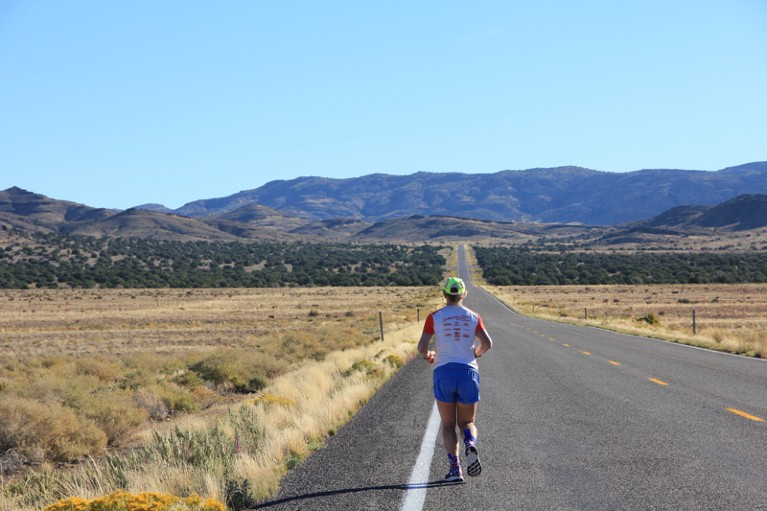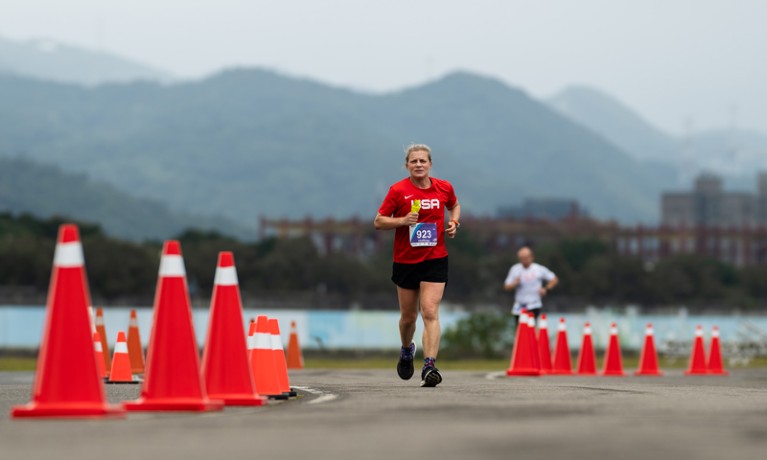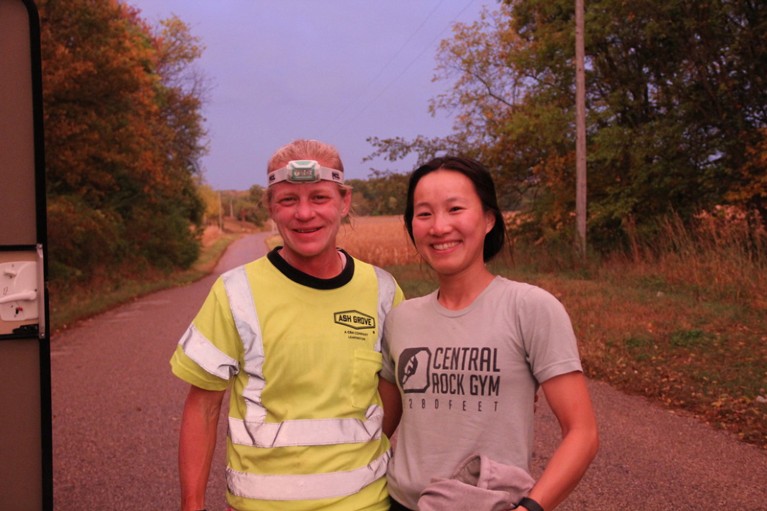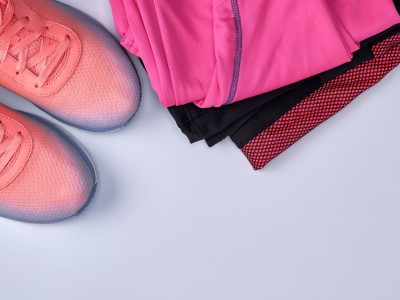
Physicist Jenny Hoffman working the lengthy highway by Utah on day 11 of her record-setting journey throughout the US.Credit score: Jill Yeomans
Jenny Hoffman made a last-minute determination to launch a brand new try and run throughout the US, coast to coast, in pursuit of a world document. A physicist at Harvard College who research the properties of insulators and conductive supplies, she turned to the time-honoured methodology of recruiting prepared college students to assist. In simply two weeks, she pulled collectively an enthusiastic group to accompany her alongside the route, supplying her with meals, water and emotional assist.
Hoffman took a sabbatical, left her laboratory within the care of a senior analysis scientist and set off from San Francisco on 16 September 2023. Her 4,888-kilometre route took her by California, Nevada, Utah, Colorado, Nebraska, Iowa, Illinois, Indiana, Ohio, Pennsylvania, New Jersey and New York. Sleeping in a camper-van that adopted her alongside the best way, she averaged greater than 100 kilometres per day whereas navigating narrow-shouldered highways, thunderstorms, canine and even giant items of farm gear that just about ran her off the highway.
A mere 47 days, 12 hours and 35 minutes later, Hoffman arrived on the New York Metropolis Corridor. For the ultimate few kilometres, she was accompanied by dozens of pals, relations and followers. Her time smashed the earlier ladies’s document by greater than every week. She returned to Harvard’s physics division in Cambridge, Massachusetts, victorious. Lower than a month later, she flew to Taiwan to compete within the 24H World Championship, a global 24-hour run, by which she was positioned twenty third on the planet.
Embracing problem: combining marathon coaching with graduate research
Now, Hoffman is again within the lab, writing grant proposals in an workplace her colleagues had adorned with balloons, and making an attempt to readjust her metabolism after consuming 8,000 energy a day whereas racing. She’s additionally making an attempt to determine on her subsequent massive aim, which could not be an athletic one. “You possibly can have a scientific impression, however you may as well have an effect by being mentor or giving any person the arrogance they should do a tough factor,” she says. “The individuals impacts are perhaps extra accessible to me proper now.”
Double obligation
Many scientists would fear that the intensive coaching wanted to attain an excessive athletic aim would have an effect on their analysis output. However Hoffman is not any slouch. Her lab has revealed dozens of papers, together with one in Science final March about quantum oscillation in a kind of insulator materials1. She mentors college students in her lab and others, and attends quite a few conferences. “I don’t assume there’s any compromise in any dimension of her life,” says Daniel Lieberman, an anthropologist at Harvard who research the evolution of human athleticism and runs with Hoffman each Tuesday morning. “I don’t assume she sleeps.”
Hoffman insists that she does sleep — for round seven hours an evening — however says that, for her, working is a essential life perform. “It’s simply a part of the self-care that I that I do every single day,” she says. “Even when you have a grant due tomorrow, you’re gonna brush your enamel, proper?” Monitoring her time and in search of methods to make issues extra environment friendly helps, though she concedes that she has no time for a social life past her husband and three youngsters.

A number of weeks after finishing her run throughout the nation, Jenny Hoffman competed for Group USA within the 24H World Championship 24-hour race in Taiwan.Credit score: Howie Stern
She does regularly fear that she is neglecting both her profession or her athletic pursuits. “There’s this delusion of getting all of it or doing all of it and you may’t,” she says. “I’m undoubtedly not nearly as good a physicist as I might be if I weren’t working, and I’m not nearly as good a runner as if I have been full-time. However you solely get one life, and I don’t wish to throw away both of these actions.”
Operating has been part of Hoffman’s life for greater than 30 years, though she solely began pursuing it critically in 2014, after her third baby was born. She by no means anticipated to achieve success. However she quickly discovered herself profitable ultramarathons — races which might be 50 km, 100 km and longer — and her aims turned increasingly troublesome. Her 2023 run throughout the US was her third strive, following a very heartbreaking try in 2019, when she injured her knee with solely 800 kilometres left to go.
Teamwork makes the dream work
The most recent run couldn’t have occurred with out a whole lot of teamwork, Hoffman says. Throughout essentially the most intensive two weeks of coaching, the period of time she spent within the lab halved, however she trusted her group, comprising round 30 individuals, to maintain the science going. “I’m actually fortunate that I’ve an amazing group of scholars who work collectively as a group very well and so they’re capable of flip to one another for questions and recommendation,” she says. The group, she says, was used to working with out her being bodily current on account of the COVID-19 pandemic, and her senior scientist was capable of deputize for her, dealing with issues.
The coaching and run itself wanted a group, too, which included Hoffman’s husband, in addition to therapeutic massage therapists and an expert logistics coordinator, together with a assist group cobbled collectively from college students and previous pals. Amongst them was Yanting Teng, a physics scholar at Harvard who signed as much as drive Hoffman’s assist van in Iowa and Illinois. Teng was notably impressed with Hoffman’s drive to get to her subsequent stopping level every day, and her willingness to push additional if she was sad along with her progress that day. “If she needs to do one thing and feels good about it, she is going to go for it,” Teng says. “I’ve by no means seen anybody so decided.”

Graduate scholar Yanting Teng (proper) helped on Jenny Hoffman’s assist crew for a part of the journey.Credit score: Jill Yeomans
Dedication is perhaps the important thing to being ultrarunner — and scientist, Hoffman says. “That you must be okay with repetition to achieve success within the lab and typically you could repeat a job many instances to get it proper,” she says. “I believe that very same sort of mentality applies to working lengthy distances.”
Science itself helps that evaluation. Though little analysis has been performed on ultrarunners, Lieberman says that psychological stamina and ache tolerance are essentially the most essential traits, on high of excellent kind and endurance. The human physique developed to run lengthy distances quite than quick sprints, he says, however land mammals didn’t evolve to run Hoffman’s common of 101 kilometres a day. “No horse can do what Jenny did,” he says. “You’d kill the horse.”
To Hoffman, working lengthy distances shouldn’t be solely a private problem, but in addition a essential escape. Many individuals with demanding careers discover that they assume most clearly whereas working or understanding, describing it as an opportunity to clear the thoughts and take into consideration issues in a brand new approach. However Hoffman says she by no means thinks about physics whereas working. As an alternative, she listens to audiobooks.
In actual fact, Hoffman says, the target nature of the game places her day job in perspective. “Human judgement performs an enormous position in science and far much less of a job in working, so I actually respect with the ability to do one thing the place any person else’s opinion doesn’t matter,” she says. “There’s no nameless peer reviewer. I simply run the time I run.”


